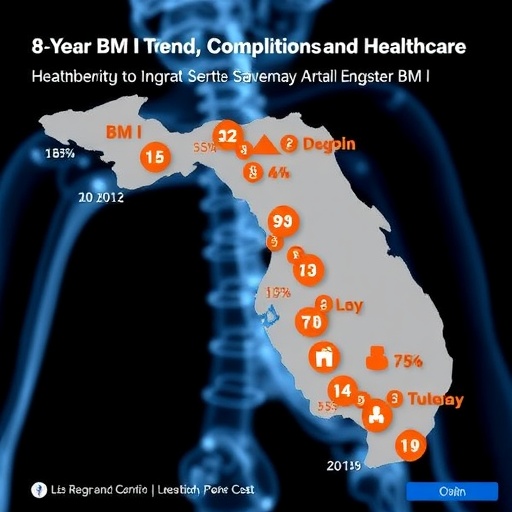
Obesity has emerged as a global health crisis, underpinning a plethora of complications and exorbitant healthcare costs around the world. Recent research by Busetto et al. delves into the trajectory of body mass index (BMI) over a span of eight years among individuals in the UK grappling with overweight and obesity. This longitudinal study offers critical insights not only into the progression of BMI but also highlights the alarming rise of related health complications and financial burdens on healthcare systems.
The investigation into BMI trends and resultant health complications sheds light on the multifaceted challenges posed by obesity. As individuals accumulate weight over the years, their chances of developing comorbid conditions such as type 2 diabetes, cardiovascular disease, and various forms of cancer correspondingly increase. Notably, the research emphasizes that fluctuations in BMI do not merely represent numbers on a scale but signify profound metabolic shifts that can lead to significant detriment in one’s health status.
One striking revelation from the study is the correlation between BMI progression and healthcare expenditures. As individuals move up the BMI categories—from overweight to obese—the costs associated with managing obesity-related health issues escalate dramatically. This research provides compelling evidence that highlights an urgent need for policymakers to reassess healthcare funding and prioritize preventive measures against obesity, which could ultimately reduce the financial burden on the healthcare system.
Moreover, the eight-year timeframe of the study allows for a detailed observation of the patterns in body weight progression. Understanding how BMI evolves over time amongst varying demographics, including age, sex, and socioeconomic status, offers a nuanced perspective on how obesity is not a singular problem but a societal epidemic. This aspect of the research encourages a multi-pronged approach, requiring collaboration between clinicians, public health professionals, and policymakers to address the factors contributing to the obesity crisis.
Interventions targeting lifestyle changes, such as improved diet and increased physical activity, remain at the forefront of combating obesity. The findings from this study further support the notion that sustained efforts are essential to not only prevent the onset of obesity but also reverse its detrimental effects on health. By illustrating the long-term implications of BMI progression, the research reinforces the importance of early intervention and comprehensive management strategies.
The implications of the findings extend beyond healthcare costs; they also touch upon quality of life issues. Individuals living with obesity often experience a decline in overall well-being, marked by psychological stressors, social stigmatization, and reduced life expectancy. Importantly, the study underscores that addressing these facets of obesity goes hand in hand with medical interventions. A holistic approach can foster improved outcomes not only in health metrics but also in enhancing the life experiences of those affected.
While the focus of the study is principally on UK populations, the implications of its findings resonate globally. Other countries battling obesity would benefit immensely from examining similar longitudinal data and understanding the unique socio-cultural factors that influence weight gain and health outcomes. The global nature of the obesity epidemic necessitates a collective effort in knowledge sharing and strategy development to promote public health initiatives tailored to local contexts.
As the research highlights the escalating rates of obesity in the UK, it becomes imperative to consider broader trends affecting its prevalence. Factors such as urbanization, dietary shifts towards processed foods, and sedentary lifestyles caused by technology have all contributed to rising obesity rates. Interdisciplinary approaches, drawing insights from sociology, psychology, and environmental science, could pave the way for innovative solutions to mitigate these influences and promote healthier living environments.
The call to action presented by Busetto et al. cannot be overstated. Without immediate and concerted efforts to combat obesity, the health of future generations is at stake. The healthcare system will continue to grapple with overwhelming costs and resource strain, unless preventive measures become a priority. As awareness grows around the metrics of BMI and its health ramifications, the integration of public health policies aimed at obesity prevention will be essential for developing sustainable healthcare practices.
Furthermore, continued research into the mechanisms of weight gain and loss, particularly the genetic, hormonal, and environmental contributors, must remain a focus within the medical community. Understanding the complexity of obesity is crucial not only for individual treatment plans but also for the design of public health initiatives. The interplay between genetics and lifestyle factors demonstrates the necessity of personalized approaches in treatment, recognizing that no single solution fits all.
In conclusion, the research conducted by Busetto et al. serves as a pivotal contribution to understanding body mass index progression and its associated ramifications over time. The profound connections established between BMI, healthcare costs, and health complications elucidate the pressing need for concerted action against the obesity epidemic. This urgency must resonate with healthcare providers, policymakers, and society at large as we collectively work towards a healthier future that prioritizes prevention and well-being for all.
Understanding the full scope of the obesity crisis, as laid out in this comprehensive study, is crucial to developing effective strategies for prevention and management. Committing to long-term monitoring, resource allocation, and community engagement will cement the foundations necessary for tackling obesity, ultimately improving health outcomes and quality of life for individuals across the globe.
Subject of Research: Body Mass Index Progression Over 8 Years in UK Individuals Living With Overweight/Obesity
Article Title: Body Mass Index Progression, Development of Complications and Healthcare Costs Over 8 Years in UK Individuals Living With Overweight/Obesity.
Article References:
Busetto, L., Capucci, S., da Rocha Fernandes, J.D. et al. Body Mass Index Progression, Development of Complications and Healthcare Costs Over 8 Years in UK Individuals Living With Overweight/Obesity.
Adv Ther 42, 4626–4640 (2025). https://doi.org/10.1007/s12325-025-03285-6
Image Credits: AI Generated
DOI: https://doi.org/10.1007/s12325-025-03285-6
Keywords: Obesity, Body Mass Index, Healthcare Costs, UK, Longitudinal Study, Health Complications, Public Health
Tags: cardiovascular disease and obesity linkcomorbid conditions related to obesitycomplications of high body mass indexfinancial burden of obesity managementhealth implications of obesityhealthcare costs of obesitylongitudinal study on BMImetabolic shifts from weight gainobesity trends over eight yearsrising healthcare expenditures obesitytype 2 diabetes and obesity correlationurgent need for obesity policy reforms




